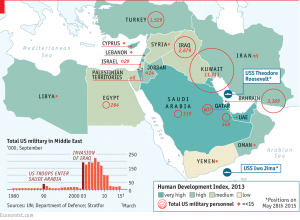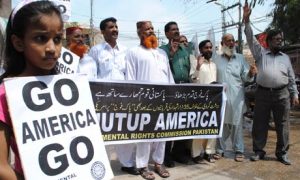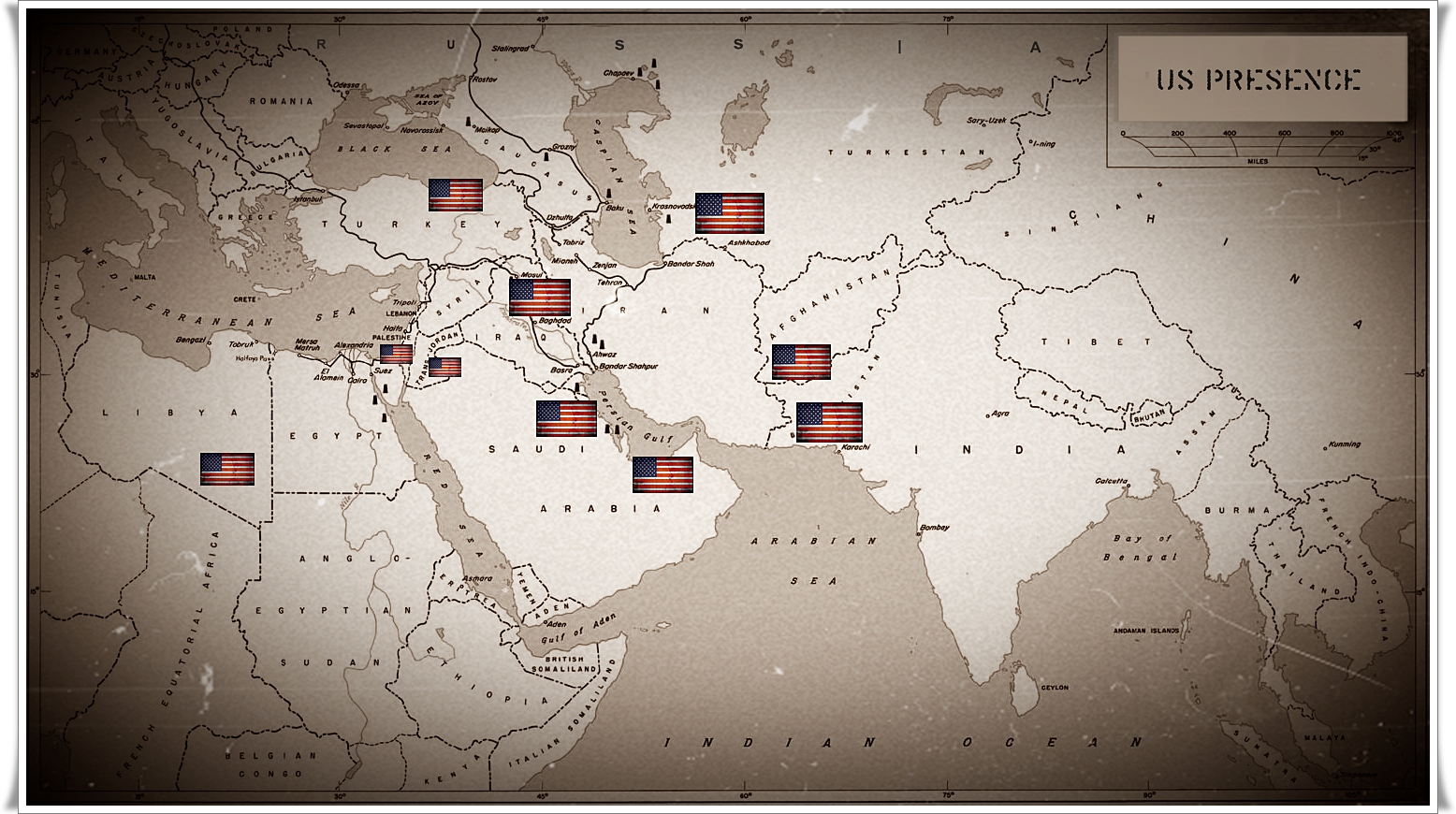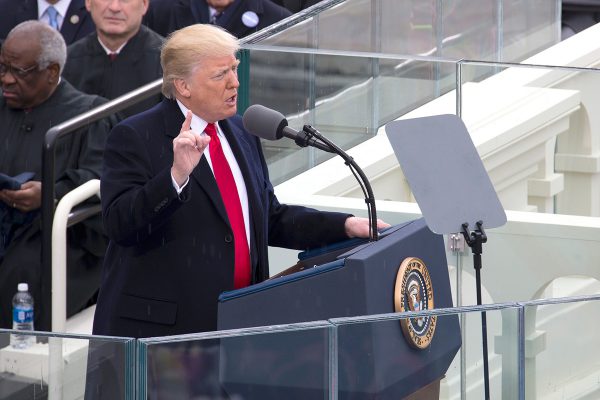Is the American Influence in the Middle East declining? The question of whether or not the United States has a declining influence in the Middle East is not a simple one. In fact Dafna Hochman Rand, Deputy Assistant Secretary at the Bureau of Democracy, Human Rights and Labor stated in a policy brief that the decline of U.S. influence in the Middle East ‘is an oversimplification of the issue.’ If it is an ‘oversimplification’, does that mean American influence in the Middle East is on the decline, rise or just stagnant?
In order to answer the previously stipulated question it is important to look at various regions of the Middle East and see how American influence is both perceived and accepted. First and foremost, the current administration’s stance toward Syria. U.S. Congressman Bob Dold, a Republican from Illinois feels that it is not an issue of influence rather an issue of leadership. In a recent interview with the Congressman he answered the question of whether or not the US influence in the Middle East has been decreasing with, ‘I don’t know that it is necessarily losing influence. I think that the United States lack of leadership has really had an impact and that has an effect on what people will do, and what nations will do.’

Congressman Dold set as an example President Obama’s red line stance in Syria. ‘A red line in Syria that frankly the Syrians trampled over it, not once, not twice, but well over a dozen times. The world is watching, what will be the response when the President of the United States and this administration says, ‘this is the red line’ and then it is ignored. And there is no response from the United States.’ Dold asserted that our allies and enemies are watching and our allies do not want to ‘stick my neck out, because I don’t know if the United States will be there.’ In essence it emboldens the enemies of the United States while weakening America’s presence and influence with its allies. As Dold stated in the interview, ‘It creates a far more dangerous world, when the United States does not step up to lead and follow through on its commitments.’
What happens when the United States does not lead? Nations like Russia become emboldened. In the interview with Congressman Dold he was asked whether potential candidates Donald Trump or Hillary Clinton’s foreign policy could reverse the trend of countries in the Middle East looking towards Russia to assure their security. In terms of the current strife in Syria he stated that Russia is ‘helping Syria and having planes actually attack folks that have been helpful to the United States in the past, claiming they were going after ISIS and we realized that was not the case, there were going after folks that were anti-Assad.’ Dold reinforced that it was a problem and that ‘we are seeing Russia and Putin flex their muscles and take a far more aggressive stance that we would like and it requires the United States leadership to assure the world that we will be there.’
Essentially, the issue in Syria is not a lack of influence, rather a lack of firm leadership. What about Iran? The United States of America agreed to pay $1.7 billion to Iran, a state that sponsors terrorist groups such as Hamas, Hizbullah and Islamic Jihad, with a nuclear agreement that is unsigned and already broken by Iran. One issue with the agreement, and there are many, is that it seemed to take the Obama administration’s utmost attention which led to neglecting many of the Middle East’s other critical issues. The American president supported the anti-government protestors instead of Assad’s regime. Initially this could be seen as a political maneuver, but what happened when the most effective anti-Assad fighters turned out to be ISIS?

A second issue with the Nuclear Agreement is that by releasing billions of dollars to Iran, essentially the United States is helping to fund terror. U.S. Congressman Dold, when asked about this responded, ‘I think that this deal, honestly, is awful. Awful for the United States, awful for its allies. We certainly know that those dollars are going to be funneled into places like Hizbullah, Hamas and to Assad in Syria.’
A third problem is that this agreement ensures Iran gets a nuclear weapon. The United States’ previous administrations have done all they could to prevent a nuclear Iran. However, the current administrations lack of leadership and negotiating capabilities has acquiesced to not having anytime, anywhere inspections and has done nothing when Iran has broken its agreement. Dold stated, ‘and frankly we have seen Iran already break its agreement with the United Nations, testing of rockets, not once, not twice, three times. The most recent one the side of the rockets basically saying ‘Death to Israel’.
‘We see the influence and the shifting of influence there as Iran becomes emboldened and how they bully neighbors there, and how the neighbors will respond to this as well. The world is watching. They are watching what happens in the United States. And the lack of leadership from the United States, someone will rush to fill that void.’
The United States has abstained from helping allies in the Middle East (Sisi in Egypt, Saleh in Yemen, etc). The lack of support for the Syrian Moderate Rebels created a resentment in the region. GCC countries led by Saudi Arabia have recently said they do not believe the United States could assure their security if Iran succeeds in gaining a nuclear arsenal. The current administration in the United States has shown a lack of leadership according to Congressman Dold. Congressman Dold feels that if Iran does gain a nuclear weapon, ‘it will have a huge ripple effect in the region. A nuclear power has to be treated differently than a non-nuclear power.’ Again though, it is not an influence loss, but rather a lack of leadership from the United States that causes nations in the Middle East to ponder.
It is an uncontested fact that the United States, on some level, has influence in the Middle East. What can be done to strengthen it? ‘The United States has an obligation to step up and be the leader of the free world.’ Dold went on to comment that the ‘world knows that we will be shoulder to shoulder with Israel’. He also mentioned that following through with commitments would be the first step to strengthen influence. One issue for Dold is the fact that ‘Mushroom Diplomacy’ is being done. ‘In a sense, they are talking to neighbors in the dark.’ Granted this gives a united front for the nations in the Middle East to combat a nuclear Iran politically.
Congressman Dold asserts that a ‘memorandum of understanding would certainly be positive.’ However bi-partisan effort is needed. Congressman Dold discussed an issue during his interview, the Visa Waiver Program. The House of Representatives passed an amendment to the Visa Waiver Program that would prevent those with a visa waiver passport to enter the United States if they had travelled to Iran, Syria, and Iraq. This almost caused Iran to walk on the agreement because it was to them a sanction. According to Dold, ‘Secretary Kerry said, ‘well perhaps we might be able to waiver on this.’ This is a complete opposition to the bi-partisan effort and law that passed in the United States Congress.’ Dold said that the United States needed to avoid doing things like that to ‘build confidence amongst our allies in the region.’
When asked how to ease tensions between the United States and her Middle Eastern allies like Israel and Saudi Arabia and how to strengthen their alliances, Congressman Dold said, ‘this is about diplomacy, and making sure the United States in actively engaged. Because when we (United States) are not actively engaged someone else will be.’
The Institute for National Security Studies 2014-2015 edition of Strategic Survey for Israel has an article entitled International Involvement in the Middle East. The article states that relations between the two nations (US and Israel) were in ‘good condition’. It cites proof of this by showing how military equipment deals were extended to include the purchase of F-35 warplanes and the ‘no’ vote cast on December 30, 2014 on the Palestinian resolution and the US readiness to veto if passed. However, it should be noted that during Operation Protective Edge, the United States delayed shipment of Hellfire missiles, Secretary of State Kerry’s abysmal efforts in the nine month long negotiations between Israel and the Palestinians actually spurred ‘a campaign of accusations and personal vilification ensued between senior Israeli and American officials, with the Americans involved in the political process placing most of the blame for the failure of the talks on Israel and its settlement policy.’
If it is not a deterioration of American influence in the Middle East, or certainly a rising one, then is it fair to say that American influence in the Middle East is simply stagnant? To answer this question it is pertinent to paraphrase a well-known quote by Mark Twain, the reports that the United States has lost its influence in the Middle East were greatly exaggerated. What was lost, is strong American leadership and trust between nations that will need to be built back up in order to ensure stability in the region.







